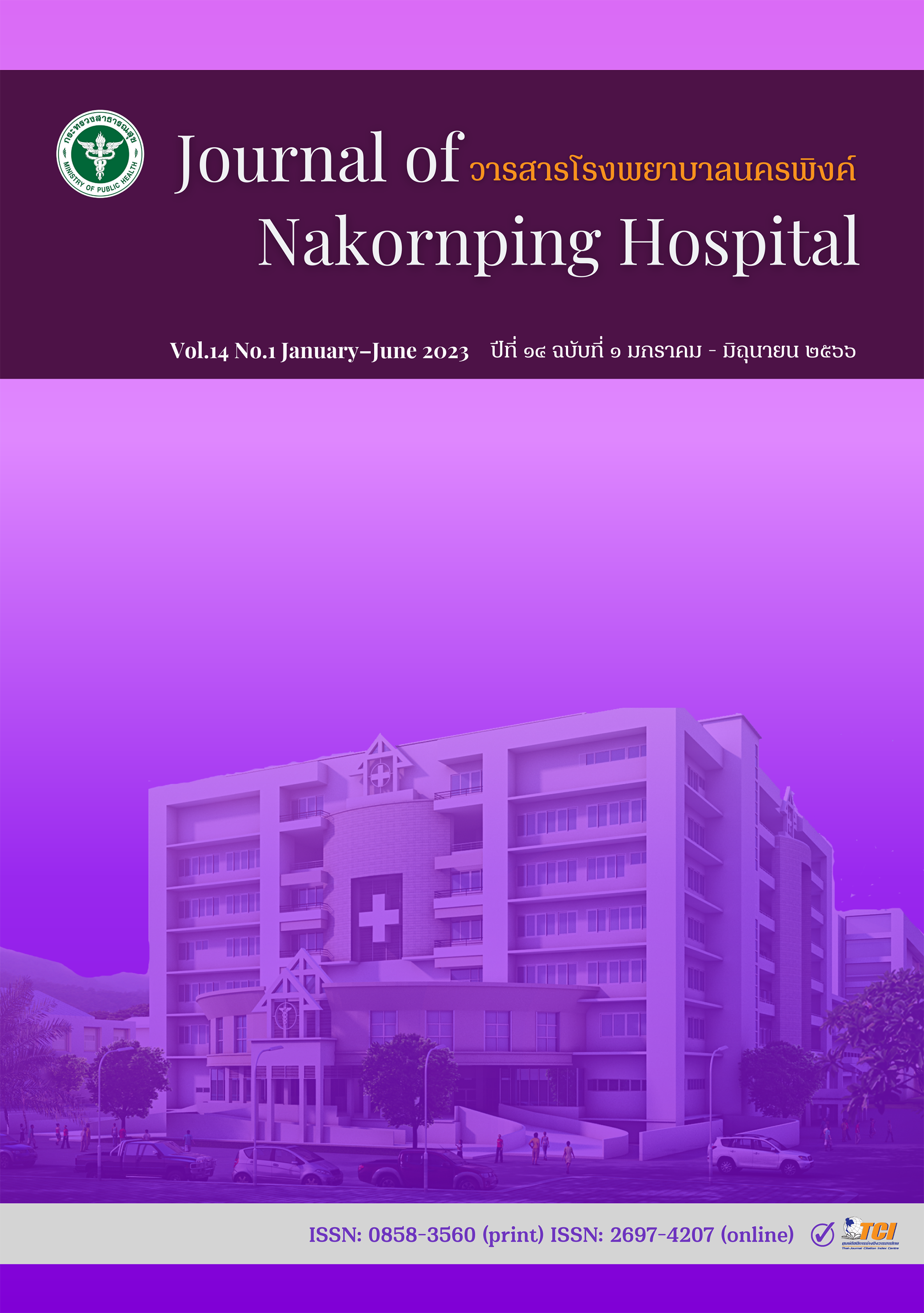Effect of early oral feeding within 24 hours compared to standard oral feeding in peptic ulcer and proximal small bowel perforation, A non-randomized controlled trial
Keywords:
peptic ulcer perforation, proximal small bowel, perforation , feeding, postoperative recoveryAbstract
Objectives: This study aims to compare the outcomes of postoperative early oral feeding within 24 hours following surgery for peptic ulcer and proximal small bowel perforation between patients who started oral feeding within 24 hours and those who followed the standard practice of oral feeding. The study evaluates the impact on reducing hospital length of stay, complications, nasogastric tube retention, urine catheter retention, mortality, and readmission within 30 days after surgery.
Methods: This non-randomized controlled trial was conducted on patients who underwent surgery for peptic ulcer and proximal small bowel perforation at Nakhonping Hospital between August 2020 and August 2021. The study compared a group of patients who started oral feeding within 24 hours (early feeding group) with a group of patients who followed the standard practice of starting oral feeding after 24 hours (standard group). The sample size was stratified according to the operating surgeon. Data analysis included descriptive statistics, Fisher's exact test, and independent t-test to compare differences. Multivariable linear regression was used to adjust for confounding variables.
Results: A total of 26 patients with peptic ulcer and proximal small bowel perforation participated in the study, with 17 patients (65.4%) in the group that started oral feeding within 24 hours and 9 patients (34.6%) in the standard oral feeding group. Baseline characteristics such as gender, age, body mass index, and comorbidities did not significantly differ between the two groups. The group that started oral feeding within 24 hours had a significantly shorter average hospital length of stay (3.39 ± 0.76 days) compared to the standard oral feeding group (6.04 ± 1.56 days), p-value < 0.001. One patient in the early feeding group experienced complications such as postoperative complications, repeated nasogastric tube insertion, and surgical site infections. There were no cases of hospital readmission or mortality within 30 days in either group. Multivariable linear regression analysis, adjusted for post-operative drainage, showed that early feeding group after surgery for peptic ulcer and proximal small bowel perforation could significantly reduce hospital length of stay by -2.04 days (95% CI -3.00, -1.08), p-value < 0.001.
Conclusion: Initiating early postoperative oral feeding within 24 hours after surgery for peptic ulcer and proximal small bowel perforation can lead to a reduction in hospital length of stay. Further studies should be conducted to explore the safety and potential complications before implementing this practice.
References
Chung KT, Shelat VG. Perforated peptic ulcer - an update. World J Gastrointest Surg. 2017;9(1):1-12. doi: 10.4240/wjgs.v9.i1.1.
Bertleff MJ, Lange JF. Perforated peptic ulcer disease: a review of history and treatment. Dig Surg. 2010;27(3):161-9. doi: 10.1159/000264653.
Eisner F, Hermann D, Bajaeifer K, Glatzle J, Konigsrainer A, Kuper MA. Gastric Ulcer Complications after the Introduction of Proton Pump Inhibitors into Clinical Routine: 20-Year Experience. Visc Med. 2017;33(3):221-6. doi: 10.1159/000475450.
Ljungqvist O, Scott M, Fearon KC. Enhanced Recovery After Surgery: A Review. JAMA Surg. 2017;152(3):292-98. doi: 10.1001/jamasurg.2016.4952.
Gonenc M, Dural AC, Celik F, Akarsu C, Kocatas A, Kalayci MU, et al. Enhanced postoperative recovery pathways in emergency surgery: a randomised controlled clinical trial. Am J Surg. 2014;207(6):807-14. doi: 10.1016/j.amjsurg.2013.07.025.
Mohsina S, Shanmugam D, Sureshkumar S, Kundra P, Mahalakshmy T, Kate V. Adapted ERAS Pathway vs. Standard Care in Patients with Perforated Duodenal Ulcer-a Randomized Controlled Trial. J Gastrointest Surg. 2018;22(1):107-16. doi: 10.1007/s11605-017-3474-2.
Jones MK, Tomikawa M, Mohajer B, Tarnawski AS. Gastrointestinal mucosal regeneration: role of growth factors. Front Biosci. 1999;4:D303-9. doi: 10.2741/a428.
Nelson R, Edwards S, Tse B. Prophylactic nasogastric decompression after abdominal surgery. Cochrane Database Syst Rev. 2007;2007(3):Cd004929. doi: 10.1002/14651858.CD004929.pub3.
Carrère N, Seulin P, Julio CH, Bloom E, Gouzi JL, Pradère B. Is nasogastric or nasojejunal decompression necessary after gastrectomy? A prospective randomized trial. World J Surg. 2007;31(1):122-7. doi: 10.1007/s00268-006-0430-9.
Jang A, Jeong O. Early Postoperative Oral Feeding After Total Gastrectomy in Gastric Carcinoma Patients: A Retrospective Before-After Study Using Propensity Score Matching. JPEN J Parenter Enteral Nutr. 2019;43(5):649-57. doi: 10.1002/jpen.1438.
Thapa PB, Nagarkoti K, Lama T, Maharjan DK, Tuladhar M. Early enteral feeding in intestinal anastomosis. J Nepal Health Res Counc. 2011;9(1):1-5.
Abdalla E, Kamel EZ, Farrag WS. Intravenous dexamethasone combined with intrathecal atropine to prevent morphine-related nausea and vomiting after cesarean delivery: A randomized double-blinded study. Egyptian Journal of Anaesthesia. 2019;35(1):65-70.
Borchardt RA, Tzizik D. Update on surgical site infections: The new CDC guidelines. JAAPA. 2018;31(4):52-4. doi:10.1097/01.JAA.0000531052.82007.42.
Petrowsky H, Demartines N, Rousson V, Clavien PA. Evidence-based value of prophylactic drainage in gastrointestinal surgery: a systematic review and meta-analyses. Ann Surg. 2004;240(6):1074-84; discussion 84-5. doi: 10.1097/01.sla.0000146149.17411.c5.
Downloads
Published
How to Cite
Issue
Section
License
Copyright (c) 2023 Nakornping Hospital

This work is licensed under a Creative Commons Attribution-NonCommercial-NoDerivatives 4.0 International License.
The articles that had been published in the journal is copyright of Journal of Nakornping hospital, Chiang Mai.
Contents and comments in the articles in Journal of Nakornping hospital are at owner’s responsibilities that editor team may not totally agree with.



